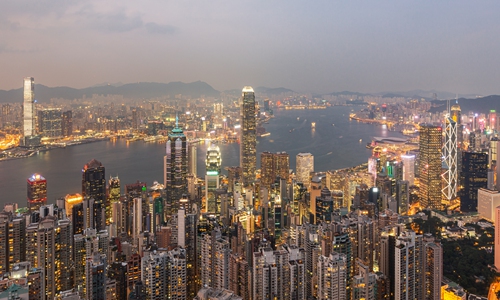HOME >> BUSINESS
Reversing economic downtrend significant to Hong Kong’s future: experts
By Wang Cong Source:Global Times Published: 2019/11/17 20:28:40
Reversing downtrend hugely significant to city’s future: experts

A view of Hong Kong in June Photo: IC
While seemingly endless violence and vandalism in the Hong Kong Special Administrative Region (HKSAR) are dominating headlines around the world and posing tough challenges for the city, another potentially deeper problem is emerging: economic recession.
Newly revised official data released on Friday indicated that the city's economy has run into serious trouble. During the July-September quarter, Hong Kong's GDP contracted by 2.9 percent year-on-year, the weakest quarter since the global financial crisis hit the city in 2008.
Hong Kong's economy shrank 3.2 percent in the third quarter from the previous quarter and the decline followed a 0.4 percent drop in the second quarter, marking a fall in two consecutive quarters.
What's worse is that the HKSAR government has significantly lowered its full-year outlook to a contraction of 1.3 percent compared with an earlier estimate of zero to one percent growth, which would mark the first annual decline since 2009.
In a statement on Sunday, HKSAR Financial Secretary Paul Chan Mo-po attributed the contraction to external pressure on trade and the raging violence. "The worsening social crisis has significantly increased economic downward pressure," he wrote.
Judging from the official data, tourism and trade, which are two major drivers of the Hong Kong economy, are facing the most serious challenges, while the financial market remains relatively. The situation calls for both short-term and long-term measures.
Necessary steps
In tourism and related sectors, the biggest challenge is the riots, which have deterred outside visitors, particularly from the Chinese mainland.
According to official data, of the 2.9 percent contraction in the quarter, declines in retail, catering, hotel and other sectors accounted for 2 percentage points. Between October 1 and November 10, visitor arrivals plunged more than 40 percent year-on-year, retail sales dropped 19.5 percent year-on-year and unemployment in the consumption and retail sectors rose to 5 percent.
The dire situation has led many to call for more effective measures to stop the unrest. "As long as the riots stop, the economy will recover on its own," Witman Hung Wai Man, a deputy to the National People's Congress from Hong Kong, told the Global Times on Sunday.
In the meantime, the HKSAR government needs to implement more direct measures, such as allocating additional funds to help affected companies and employees, analysts noted.
The regional government has announced several rounds of stimulus measures to support small and medium-sized companies and workers, including financial support for both employees and employers, but more could be needed to support employment.
"The most pressing issue right now is unemployment," Liang Haiming, a Hong Kong-based economist, told the Global Times on Sunday. "If workers have jobs, then there will not be any big problem for Hong Kong."
The overall unemployment rate was 2.9 percent in the latest quarter, flat with the previous quarter.
Another core industry, trade, has also been impacted, the official figures show. Imports fell 10.3 percent year-on-year in September and exports declined 7.3 percent due to a slump in global trade and the China-US trade war. Most of Hong Kong's trade relies on the Chinese mainland.
Facing such challenges, the HKSAR must expand its trade channels though the Belt and Road Initiative (BRI) rather than focus on Europe and the US, according to Liang.
But more importantly, the HKSAR government needs to offer short-term relief for companies and workers in trouble.
Hong Kong's financial sector, which accounts for one-fifth of the city's total GDP, so far appears to be stable, despite the social unrest and a gloomy global economic outlook. The exchange rate for the Hong Kong dollar has remained stable and there hasn't been any major capital outflows from the city, Hong Kong Financial Services and Treasury Secretary James Henry Lau said earlier this month.
Still, the city will continue to pursue efforts to improve its financial sector, including integration with the mainland under various initiatives, such as the BRI, the Guangdong-Hong Kong-Macao Greater Bay Area strategy and the stock connect programs, according to Lau.
Newspaper headline: Hong Kong’s new trouble – recession
Posted in: ECONOMY